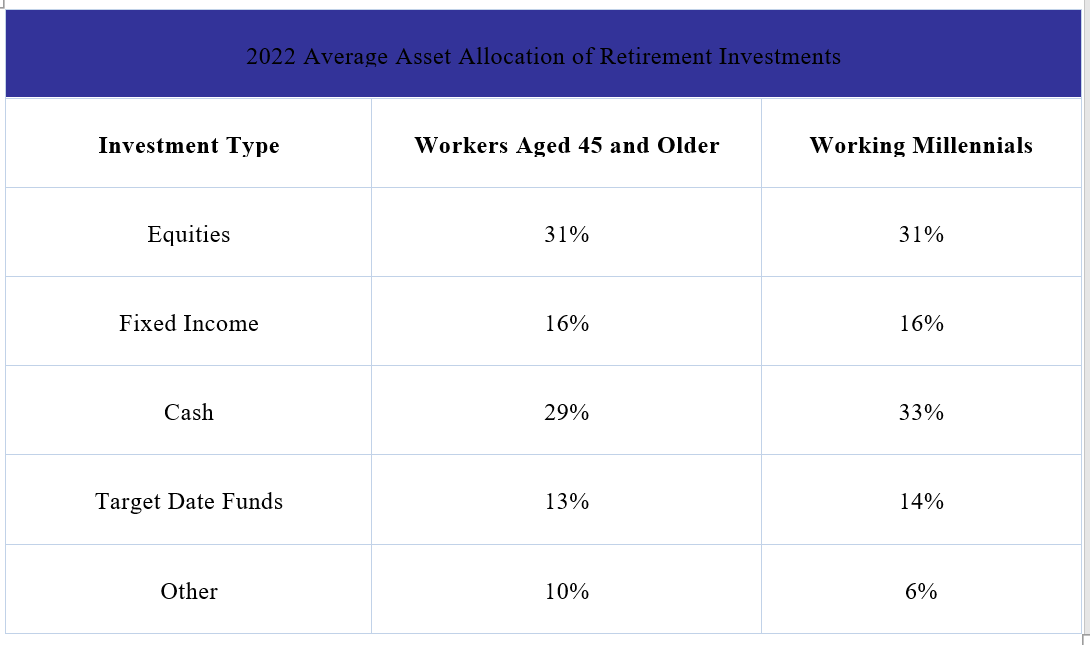 A perceived comfortable retirement may be hard to reach for many working Americans, as most say it will take at least $1 million to do so, although most don’t expect to reach that number.
A perceived comfortable retirement may be hard to reach for many working Americans, as most say it will take at least $1 million to do so, although most don’t expect to reach that number.
According to findings from Schroders’ 2023 U.S. Retirement Survey of 2,000 U.S. investors nationwide, working Americans ages 45 and older for the second year in a row believe it will take $1.1 million in savings to retire comfortably. Unfortunately, only 21% expect to reach the $1 million mark, down from 24% in 2022. And roughly 6 in 10 (59%) expect to have less than $500,000 saved, including 34% forecasting less than $250,000 in savings.
Millennial workers (ages 27-42) expect, on average, that it will take about $1.3 million to retire comfortably, but less than a third (29%) say they expect to reach $1 million in retirement savings. Almost half (49%) say they expect to have less than $500,000 saved, including 27% with less than $250,000 in savings for retirement.
Additionally, the percentage of working Americans nearing retirement age (60-67 years old) who said they have enough money saved was just 24% — a slight uptick from 22% in 2022.
“There are profound gaps between what American workers say they need for a comfortable retirement and what they expect to have,” says Deb Boyden, Schroders’ Head of U.S. Defined Contribution. “This could be from a lack of planning, or for many it might just be too hard to save and invest enough to reach their retirement goals.”
“The fact that, once again, so few Americans nearing retirement are confident they have enough money speaks volumes about the work we still need to do. All of us, from employers to advisors to our industry, must do more to make it easier for American workers to reach retirement security,” she further emphasizes.
Impact of Financial Stress
Notably, Millennials were found to spend the most time worrying about money. Among working Americans, 85% of Millennials said they worry each day about money. And those who do spend nearly two hours (1.9) per day on average or about 13 hours a week worrying. This calculates to approximately 28 full days a year worrying about money, the study notes.
It doesn’t get much better for workers ages 45 and up. In this case, nearly 7 in 10 (69%) said they worry each day about money and those who do spend on average 1.6 hours or about 11 hours each week. This amounts to approximately 24 days a year worrying about money.
Meanwhile, nearly two-thirds (64%) of working Millennials and 53% of older workers are concerned that financial stress will negatively affect their overall health. Not surprisingly, most older workers (56%) and working Millennials (55%) said the 2022 stock market greatly increased their anxiety.
What’s more, roughly half (48%) of working Millennials and half (50%) of older workers with a workplace retirement plan said the performance of their plan in 2022 caused them anxiety.
Their optimism about reaching their retirement goals has also taken a hit, as nearly two-thirds (64%) of working Millennials and 62% of older workers with workplace retirement plans worry they won’t be able to grow their workplace retirement plan assets to the level they hoped to achieve.
One reason for the pessimism could be due to high cash balances over a fear of losing money. A look at how these respondents allocate their retirement investments — including workplace plans, IRAs or other retirement accounts — reveals a significant allocation to cash.

Schroders found that the reason the majority gave for holding that much cash in their retirement accounts is safety — 62% of working Millennials and 66% of older workers say they have higher cash allocations is because they are afraid of losing too much money if the stock market goes down.
Another point of concern: 38% of working Millennials and 24% of older workers say they have no idea how their retirement assets are allocated.
Among those with a workplace retirement plan, nearly 6 in 10 (59%) working Millennials said they did not change their asset allocation in those plans in 2022; 26% said they became more conservative, and 15% said they invested more aggressively. Among older workers, 65% left their allocations unchanged, 25% became more conservative, and 10% invested more aggressively.
“Given the performance of stocks and bonds last year, it’s not surprising that fear of losing money heavily influenced asset allocations, but cash shouldn’t be king, especially for Millennials saving for retirement,” says Joel Schiffman, Schroders’ Head of Strategic Partnerships. “Even the oldest Millennials will have decades to ride out any short-term market volatility.”
The survey was conducted by 8 Acre Perspective among 2,000 U.S. investors nationwide ages 27-79, including respondents between ages 27-44 for the first time. The survey was conducted from Feb. 13–March 3, 2023. The median household income for working Americans surveyed was $75,000.
- Log in to post comments
